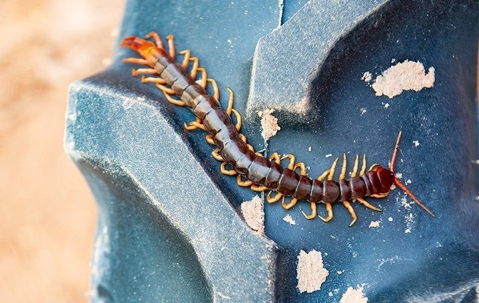Homeowners in Longview occasionally encounter strange types of pests in their homes that normally live in outdoor settings. Common examples include crickets, silverfish, millipedes, and centipedes that might enter a structure in search of food, water, or shelter from harsh weather conditions. In many cases, homeowners will abruptly enter a closet, bathroom, or laundry room and find a centipede, which has a somewhat frightful appearance.
Are you struggling with how to get rid of centipedes in your home? You are not alone, as these creatures will use their small bodies to move indoors. Keep in mind that the presence of these pests might indicate that another pest-related problem exists. An experienced Longview pest control professional understands what attracts house centipedes and how to repel centipedes.
What Are Centipedes?
Centipedes are distantly related to creatures, including lobsters and shrimp; however, they generally remain on land in warm and humid settings. Centipedes have somewhat flat bodies that are rather "worm-like." Texas is home to Scolopendra heros, which are often called the giant desert centipede or Texas redheaded centipede and might exceed five inches long. The smaller house centipede (Scutigera coleoptrata) is much more common indoors and has approximately 15 pairs of legs.
What are centipedes good for in our ecosystem? Centipedes help by reducing the population of many other pests, such as cockroaches, moths, flies, and termites. Gardeners also might welcome centipedes, as they will consume some of the more destructive types of pests.
Where do centipedes hide once they enter a home? Centipedes prefer dark and damp conditions; therefore, basements, crawl spaces, laundry rooms, and bathrooms are the most likely places to discover them.
Is It Dangerous To Have Centipedes In My House?
Centipedes in Longview are not known for carrying diseases. However, centipedes have poison glands and will bite as a last resort.
What does a house centipede bite look like? Centipede bites often create two small puncture marks and result in red and irritated skin. Larger centipedes, more commonly found in outdoor settings, usually possess more potent venom and deliver a much more painful bite compared to house centipedes. Those who experience adverse allergic reactions such as fever, nausea, or heart palpitations should seek medical assistance.
Why Are There Centipedes In My Home?
How can property owners in Longview prevent house centipedes from invading their homes? The first step involves limiting certain attractants such as:
- Limit the presence of prey such as ants, flies, and cockroaches by keeping kitchen areas free of crumbs and never leaving dirty dishes out overnight.
- Turn off bright exterior lights near entryways when not needed, as they attract a host of flying pests that centipedes eat.
- Prevent indoor access by filling cracks or crevices around the foundation and installing sweeps along the bases of exterior doors.
- Ensure basements and crawl spaces are properly ventilated, and use dehumidifiers when necessary to reduce moisture and humidity.
- Fix leaks below sinks, keep utility room drains clear, and have air conditioners that are generating excessive condensation serviced.
The most effective strategies for preventing house centipedes are similar to those that help against most other household pests. This involves diligent cleaning habits, performing regular household maintenance, and limiting points of indoor entry.
What's The Best Way To Get Rid Of Centipedes?
Are you wondering how to keep centipedes out of your house? Consult with an experienced pest management professional for eliminating these pests and get advice regarding the best ways of preventing future intrusions.
With more than two decades of experience in the home pest control industry, Gecko Pest Control understands the importance of operating with a commitment to safety, efficiency, and high-quality customer service. Our qualified technicians receive excellent training from our in-house certified entomologist. Contact our office today for further details.

